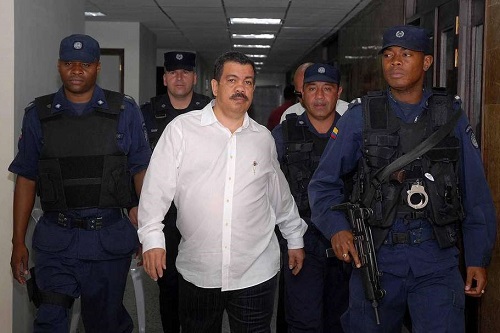AFP photo
By
Ricardo Swire
Pablo Escobar was Colombia’s most flamboyant and revered drug trafficking icon. After his dramatic death in 1993, during a rooftop shootout with law enforcement, his Medellin Cartel fragmented.
The rival Cali Cartel used this period of vulnerability to finance extralegal groups that were actually responsible for Pablo Escobar’s demise. The August 6, 1995 Colombia Federal Police detention of Cali Cartel’s Boss of Bosses signalled that criminal organization’s weakening.
Such law enforcement breakthroughs marked the beginning of the end of Colombian drug cartels’ top-to-bottom tier structure, introduced by Escobar’s Medellin operation. “First generation” Colombian cartels evolved, responding both to a shift in the global drug market and the choke-hold applied by joint Colombian/American counter-narcotics tactics. One featured Medellin crime syndicate was “Oficina de Envigado,” formed when Pablo Escobar needed competent killers.
After his death Oficina de Evigado took over several of Pablo Escobar’s extortion, money laundering and trafficking portfolios. Over time Colombia’s “Second generation” drug trafficking organizations developed, comprised of alliances. On Tuesday July 4, 2017 Federal Police detained Medellin’s Security Secretary for conspiring with the city’s most powerful crime syndicate. The Security Secretary was charged with “aggravated criminal association.” He colluded with Oficina de Evigado emissaries and allowed them to negotiate with judicial authorities.
The Security Secretary of Medellin also delivered privileged information to “El Viejo” and “Pichi Gordo,” two jailed Oficina de Evigado top-ranking figures. The Colombian senior government official’s private food distribution company was exempted routine extortion and persecution, as compensation for Oficina de Evigado participation in the official “Peace Advocate” selection, a national status conceptualized under the July 2016 Presidential Decree.
The modern Oficina de Evigado functions as a patchwork of autonomous micro units rather than a coherent organization. On New Year’s Eve 2012 nine members were massacred in Envigado, the incident described as a showdown between two generations of Oficina de Evigado leaders. The Cartel boasts alliances with “Combos” or local neighborhood gangs. Valle Del Cauca headquartered traffickers “Los Rastrojos” are close affiliates. Before the Oficina de Evigado leader Don Berna’s extradition to America in 2008 a large percentage of the Cartel’s members were from police or paramilitary backgrounds.
In 2014 America’s Department of the Treasury named eight Oficina de Envigado under-bosses, pursuant to the Foreign Narcotics Kingpin Designation Act (Kingpin Act). The Kingpins managed subordinates tasked with contract killings, extortion, drug trafficking and money laundering as core businesses. One under-boss known as “Barny” oversaw northwestern Medellin and was wanted for killing two Colombian Federal Police officers in 2012. Oficina de Envigado began to weaken in 2014, reflected by the removal of “Office” from its name.
July 2017’s arrest of the Security Secretary of Medellin was shadowed by charges of links to Colombia’s demobilized paramilitary organizations, the “Terraza,” an Oficina de Evigado splinter group, one such affiliation. A former Attorney-General Office Technical Investigation Team (CTI) rogue detective unofficially provided the Terraza cell with intelligence services, the law enforcer reporting to Terraza’s ultimate boss called “Negro.” Oficina de Evigado earns an estimated US$31.4 million yearly, singularly from money laundering. On Medellin streets its members carry pistols affixed with silencers. The cadre of criminal enforcers also possess a large arsenal of semi-automatic weapons and explosives.
Ricardo Swire
Ricardo Swire is the Principal Consultant at R-L-H Security Consultants & Business Support Services and writes on a number of important issues.



No Comments Yet!
You can be first to comment this post!